- Clone
- HIP8 (See other available formats)
- Regulatory Status
- RUO
- Workshop
- IV P38
- Other Names
- gpIIb, CD41a
- Isotype
- Mouse IgG1, κ
- Ave. Rating
- Submit a Review
- Product Citations
- publications
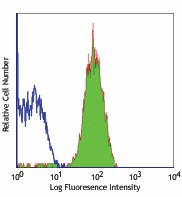
-

Human peripheral blood platelets stained with HIP8 FITC
| Cat # | Size | Price | Save |
|---|---|---|---|
| 303703 | 25 tests | ¥18,480 | |
| 303704 | 100 tests | ¥33,130 |
CD41 is a 125/25 kD α subunit of the gpIIb/IIIa (CD41/CD61) complex. CD41 is a heterodimer composed of a heavy chain (gpIIbα) and light chain (gpIIbβ) linked by a single disulfide bond. It is a member of the integrin family primarily expressed on platelets and megakaryocytes. CD41 has been reported to be involved with platelet aggregation and platelet attachment to the ECM. CD41/CD61 complex acts as the receptor for fibrinogen, fibronectin, Von Willebrand factor, and thrombin.
Product DetailsProduct Details
- Verified Reactivity
- Human
- Reported Reactivity
- African Green, Baboon, Capuchin Monkey, Cynomolgus, Rhesus
- Antibody Type
- Monoclonal
- Host Species
- Mouse
- Formulation
- Phosphate-buffered solution, pH 7.2, containing 0.09% sodium azide and BSA (origin USA)
- Preparation
- The antibody was purified by affinity chromatography, and conjugated with FITC under optimal conditions.
- Concentration
- Lot-specific (to obtain lot-specific concentration and expiration, please enter the lot number in our Certificate of Analysis online tool.)
- Storage & Handling
- The antibody solution should be stored undiluted between 2°C and 8°C, and protected from prolonged exposure to light. Do not freeze.
- Application
-
FC - Quality tested
- Recommended Usage
-
Each lot of this antibody is quality control tested by immunofluorescent staining with flow cytometric analysis. For flow cytometric staining, the suggested use of this reagent is 5 µl per million cells in 100 µl staining volume or 5 µl per 100 µl of whole blood.
- Excitation Laser
-
Blue Laser (488 nm)
- Application Notes
-
Additional reported applications (for the relevant formats) include: immunohistochemical staining of acetone-fixed frozen tissue sections and blocking of platelet aggregation2. The HIP8 antibody has been reported to block the activation of platelets by various stimuli, including collagen, and ADP.
-
Application References
(PubMed link indicates BioLegend citation) -
- Knapp W, et al. 1989. Leucocyte Typing IV. Oxford University Press. New York.
- McCarty OJT, et al. 2000. Blood 96:1789.
- Yoshino N, et al. 2000. Exp. Anim. (Tokyo) 49:97. (FC)
- Zhi L et al. 2013. PLoS One. 8:e79869. (IHC)
- Product Citations
-
- RRID
-
AB_314373 (BioLegend Cat. No. 303703)
AB_314373 (BioLegend Cat. No. 303704)
Antigen Details
- Structure
- Integrin family, α subunit of CD41/CD61 (GPIIb-IIIa) complex, 125/22 kD
- Distribution
-
Platelets, megakaryocytes
- Function
- Platelet aggregation, platelet attachment to extracellular matrix
- Ligand/Receptor
- Fibrinogen, fibronectin, von Willebrand factor, thrombin
- Cell Type
- Megakaryocytes, Platelets
- Biology Area
- Cell Adhesion, Cell Biology, Immunology
- Molecular Family
- Adhesion Molecules, CD Molecules
- Antigen References
-
1. Denzin L, et al. 1996. J. Exp. Med. 184:2153.
2. Denzin L, et al. 1995. Cell 82:155.
3. Riberdy J, et al. 1994. J. Cell Biol. 125:1225. - Gene ID
- 3674 View all products for this Gene ID
- UniProt
- View information about CD41 on UniProt.org
Related Pages & Pathways
Pages
Other Formats
View All CD41 Reagents Request Custom ConjugationCustomers Also Purchased
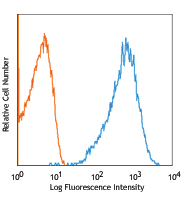
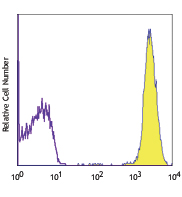
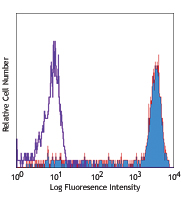
Compare Data Across All Formats
This data display is provided for general comparisons between formats.
Your actual data may vary due to variations in samples, target cells, instruments and their settings, staining conditions, and other factors.
If you need assistance with selecting the best format contact our expert technical support team.
-
APC anti-human CD41
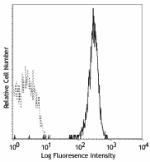
Human platelets stained with HIP8 PE -
FITC anti-human CD41
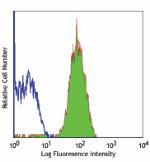
Human peripheral blood platelets stained with HIP8 FITC -
PE anti-human CD41

Human platelets stained with HIP8 PE -
PE/Cyanine5 anti-human CD41
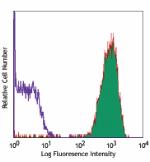
Human peripheral blood platelets stained with HIP8 PE/Cyanin... -
Purified anti-human CD41
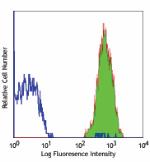
Human peripheral blood platelets stained with HIP8, followed... -
Pacific Blue™ anti-human CD41
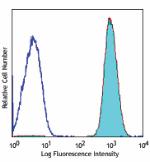
Human peripheral blood platelets were stained with CD41 (cl... -
APC/Cyanine7 anti-human CD41
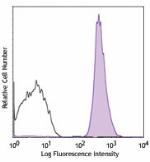
Human platelets were stained with CD41 (clone HIP8) APC/Cyan... -
PE/Cyanine7 anti-human CD41

Human platelets were stained with CD41 (clone HIP8) PE/Cyani... -
PerCP/Cyanine5.5 anti-human CD41
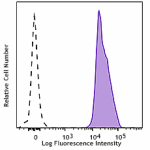
Human peripheral blood platelets were stained with CD41 (clo... -
Purified anti-human CD41 (Maxpar® Ready)
-
Alexa Fluor® 647 anti-human CD41
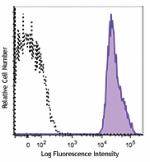
Human platelets were stained with CD41 (clone HIP8) Alexa Fl... -
Alexa Fluor® 700 anti-human CD41
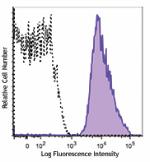
Human platelets were stained with CD41 (clone HIP8) Alexa Fl... -
Alexa Fluor® 488 anti-human CD41
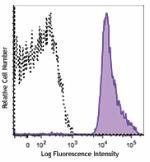
Human platelets were stained with CD41 (clone HIP8) Alexa Fl... -
Brilliant Violet 421™ anti-human CD41
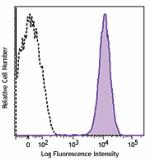
Human peripheral blood platelets were stained with CD41 (clo... -
PE/Dazzle™ 594 anti-human CD41
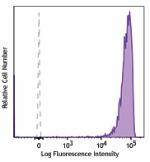
Human peripheral blood platelets were stained with anti-huma... -
Brilliant Violet 510™ anti-human CD41
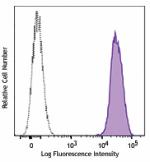
Human platelets were stained with CD41 (clone HIP8) Brillian... -
Biotin anti-human CD41
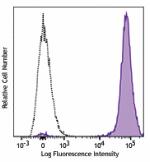
Human peripheral blood platelets were stained with biotinyla... -
TotalSeq™-A0353 anti-human CD41
-
TotalSeq™-C0353 anti-human CD41
-
Brilliant Violet 785™ anti-human CD41
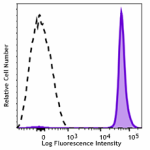
Human peripheral blood platelets were stained with anti-huma... -
Brilliant Violet 605™ anti-human CD41
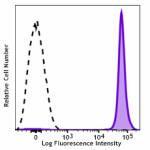
Human peripheral blood platelets were stained with anti-huma... -
Ultra-LEAF™ Purified anti-human CD41
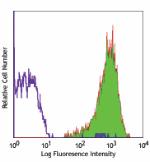
Human peripheral blood platelets stained with Ultra-LEAF™ Pu... -
TotalSeq™-B0353 anti-human CD41 Antibody
-
APC/Fire™ 750 anti-human CD41 Antibody
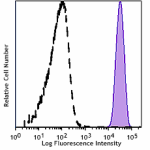
Human platelets were stained with anti-human CD41 (clone HIP... -
TotalSeq™-D0353 anti-human CD41
-
APC anti-human CD41
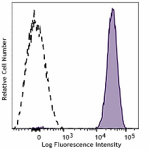
Typical results from Human peripheral blood platelets staine... -
FITC anti-human CD41
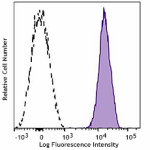
Typical results from Human peripheral blood platelets staine... -
GMP APC anti-human CD41
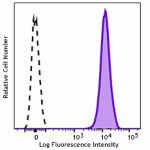
Typical results from Human peripheral blood platelets staine... -
PE anti-human CD41

Typical results from Human peripheral blood platelets staine...















Follow Us